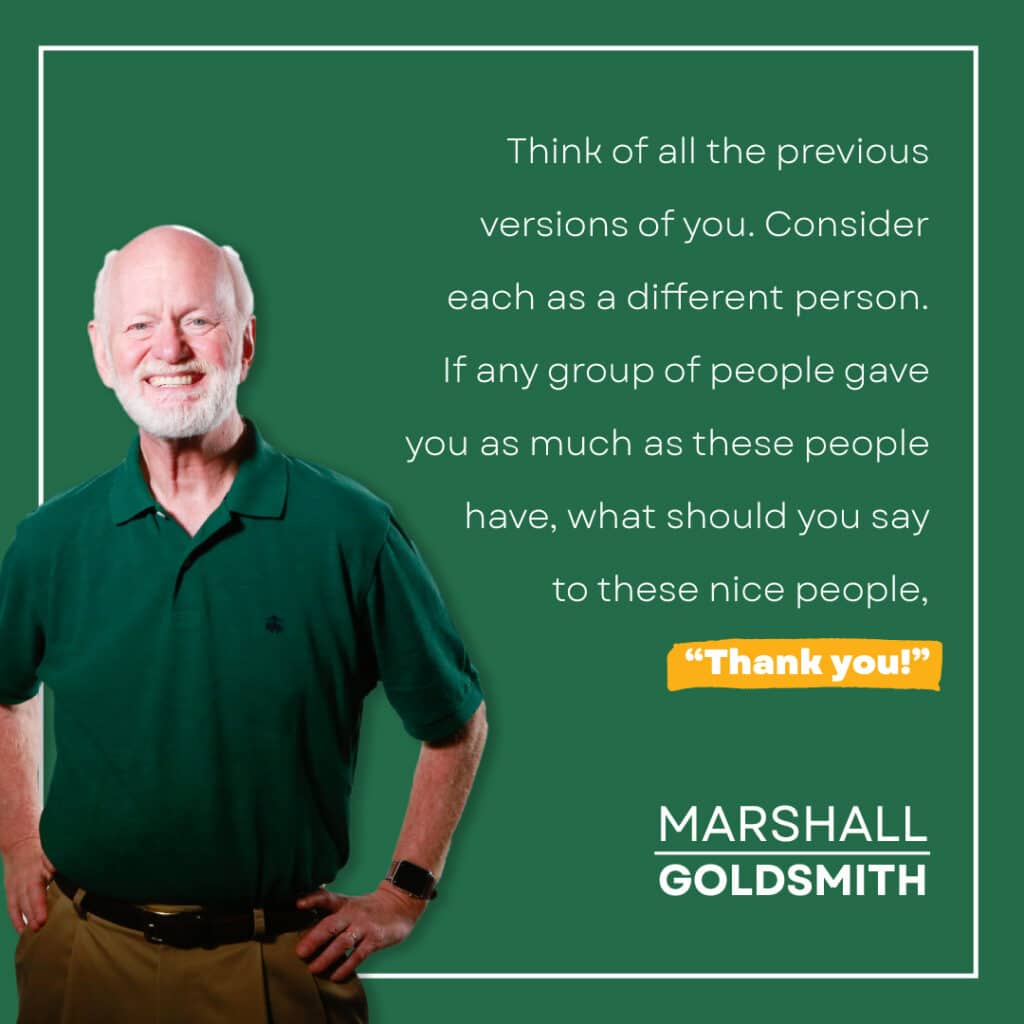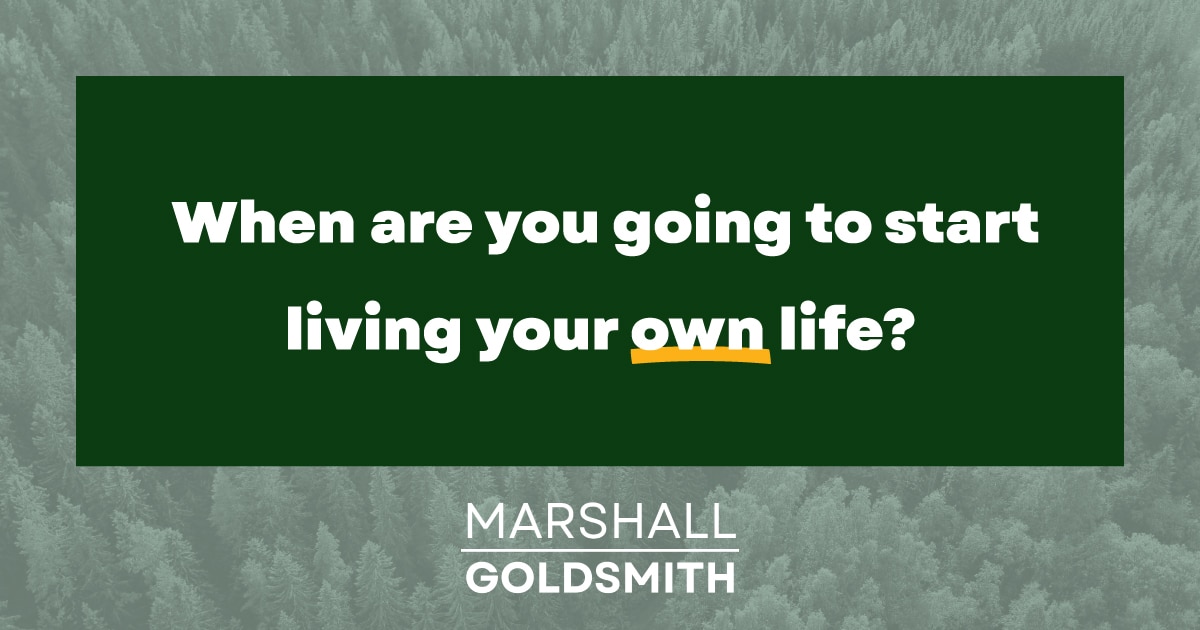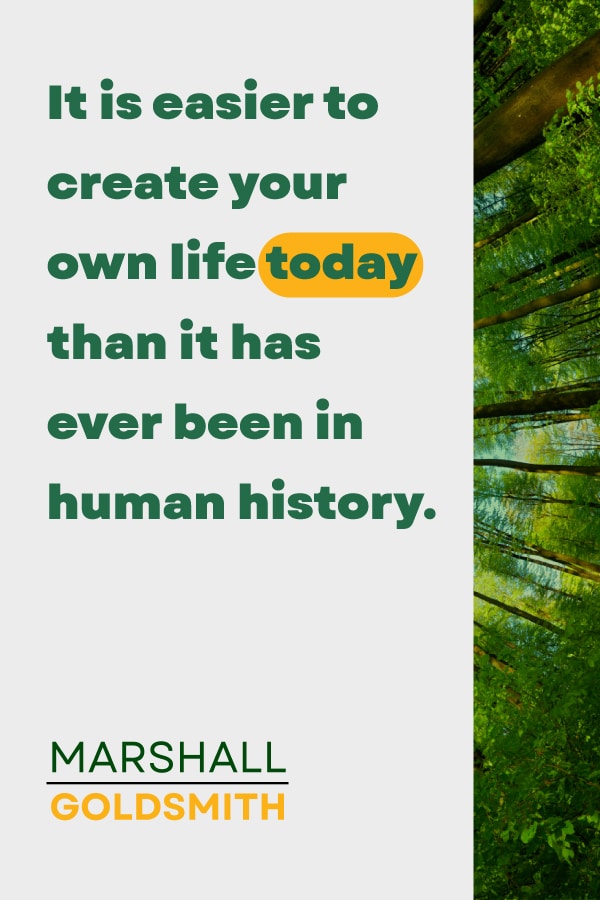Playing Favorites By Marshall Goldsmith There’s a reason I devote...
By Marshall Goldsmith
I’m sure you’ve met him, or her. That person who says he’ll finish the project tomorrow, but tomorrow never comes. Or the person who promises to call as soon as she gets home, but you never hear from her.
We know lots of people like this. If we’re a hard case, we cut them out of our lives. If we’re a “softie”, we make excuses, and try to let it go. Either way, these people, who make promises to change one day and excuses not to the next, exist.
And, we may have even done this ourselves! I know I have. For those of us who admit to it, we know our genius becomes more acute when it’s our turn to change how we behave. That’s when we fall back on a set of beliefs that trigger denial, resistance, and ultimately self-delusion. These beliefs are more wicked than excuses. An excuse is the handy explanation we offer when we disappoint other people. It is acute and convenient, often made up on the spot. Basically an excuse is a variation on “The dog ate my homework,” and these are so abused it’s a wonder anyone believes them.

What do we call the excuses we privately harbor when we disappoint ourselves? Mere “excuse” is somehow inadequate to describe these inner beliefs that represent how we interpret our world. An excuse explains why we fell short of expectations after the fact. Our inner beliefs trigger failure before it happens. They sabotage change by cancelling its possibility. We employ these beliefs as articles of faith to justify our inaction and then wish away the result. I call them belief triggers and we think them all day long. Here’s a not-extensive list, but it should get you started on where I’m going with this.
1. I am the same ‘me’
The person who promised to change yesterday is not the same person who has to execute that change today. We make promises to ourselves and others today that we cannot keep tomorrow. This is a most illusory belief – because it triggers over-confidence in our ability to execute our plan.
2. If I change I am ‘inauthentic’
We refuse to adapt our behavior to new situations because “it isn’t me.” This belief triggers stubbornness.
3. I won’t get tired
When we intend to work long hours, we’re not exhausted. But after we work several hours we become tired and are eager to throw in the towel. It’s the same with changing our ways – we grow tired with the effort it takes to change. This triggers depletion.
4. I understand the requirements
People who read my writing often tell me, “It’s common sense. I didn’t read anything here that I don’t already know.” True, but there’s a difference between understanding and doing. Just because people understand what to do doesn’t ensure that they will actually do it. This belief triggers confusion.
5. It has to be perfect
Even when we appreciate that nothing is permanent, we still believe in the idea of perfection – that there is a perfect weight, a perfect job, a perfect state of mind if only we strive harder to achieve it. This triggers hopelessness — so we give up.
6. It’s not fair
We have an unshakeable belief in the essential fairness of life – that if we do what is asked of us, we will be rewarded for it. When that faith is shaken and we see that life is not fair, we feel cheated. Our dashed expectations trigger resentment. We convince ourselves that the game is rigged against us and refuse to play again. In other words, we stop trying.
7. I can do it on my own
We believe that we are solely responsible for our own happiness and success, that positive change starts and ends within us and is neither shaped nor determined by the people around us. We abuse self-sufficiency, ignoring the value of a supportive environment, taking foolish pride in doing it all ourselves. We trigger our isolation.
8. Nothing will interrupt my focus
We don’t plan for the low-probability events because, by definition, any one of them is unlikely to occur. But in the aggregate, low probability events affect us all the time. Who plans on a flat tire, or accident, or stalled traffic because of an overturned semi on their way to work? This belief triggers unrealistic expectations.
9. ‘At least I’m better than…’
In a down moment after failure or loss, we tell ourselves, “At least I’m better than _______.” We award ourselves a free pass because we’re not the worst in the world. This is our excuse to take it easy, lowering the bar on our motivation and discipline. We’ve triggered a false sense of immunity.
10. I am exempt on this ‘special day’
Today is the Super Bowl, or my birthday, or our anniversary, or my day off. We excuse our momentary lapse as an outlier event, a blip in the long arc of committed change we are making. This belief triggers a self-indulgent inconsistency – which is fatal for change.
Overconfidence. Stubbornness. Depletion. Confusion. Hopelessness. Resentment. Isolation. Unrealistic expectations. Immunity. Inconsistency. That’s a lot of heavy baggage to carry on our journey of change.
These are just some of the rationalizations that keep us from becoming the person we want to be. Now that you’ve read them, I bet they’re nothing you’ve not heard before! Keep watch in your daily life for them, keep track of how often you use one of these trigger beliefs, see if you can come up with others. This is a great exercise, because as you know awareness is the first step towards change!

Adding Too Much Value Won’t Get You There By Marshall...
C-Suite Master Class: No, But, However By Marshall Goldsmith Continuing...
The Doerr Institute: Expanding the Market for Coaches By Marshall...
Making Leadership Development Part of the College Degree at Rice...
Sanyin Siang – Winner of the Thinkers50 Marshall Goldsmith Coaching...
Thinkers50 Marshall Goldsmith Distinguished Achievement Award in Coaching – Nominees...
Leading with Influence: What Is Influence360°? By Marshall Goldsmith Founder...
Are You a Dominator, Manipulator, Persuader or Influencer? By Marshall...
Leading with Influence: Redefining Modern Influence Part 2 By Marshall...

My mission is simple. I want to help successful people achieve positive, lasting change and behavior; for themselves, their people, and their teams. I want to help you make your life a little better. With four decades of experience helping top CEOs and executives overcome limiting beliefs and behaviors to achieve greater success, I don’t do this for fame and accolades. I do this because I love helping people!
As an executive educator and coach, I help people understand how our beliefs and the environments we operate in can trigger negative behaviors. Through simple and practical advice, I help people achieve and sustain positive behavioral change.